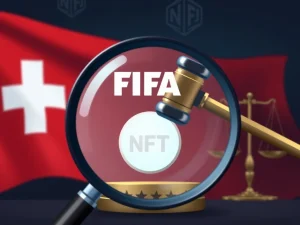Urgent Warning: NFT Scams Explode in OTC Trading, Exploiting Decentralized Vulnerabilities

The world of Non-Fungible Tokens (NFTs) is dynamic and exciting, but a sinister shadow is emerging: a worrying surge in **NFT scams**, particularly within over-the-counter (OTC) trading markets. As market activity picks up and floor prices climb, fraudsters are seizing the opportunity, exploiting the very nature of decentralized transactions to ensnare unsuspecting traders. This alarming trend demands immediate attention and a heightened sense of vigilance from everyone participating in the NFT space.
Understanding the Rise of OTC Trading and Its Perils
Over-the-counter (OTC) trading in NFTs involves direct negotiations and transactions between collectors, bypassing public marketplaces. While offering flexibility and the ability to strike custom deals, this method inherently carries lower transparency and higher counterparty risk. Recent weeks have seen a significant uptick in OTC NFT transactions, fueled by renewed interest in the market. Unfortunately, this growth has coincided with a concerning rise in fraudulent activities.
- Direct Negotiation: OTC trades allow for private agreements, often outside the scrutiny of regulated exchanges.
- Custom Pricing: Traders can negotiate unique prices or even direct swaps.
- Lower Fees (Potentially): Avoiding marketplace fees can be an attractive draw.
- Increased Risk: The lack of intermediaries means verifying counterparty legitimacy falls entirely on the traders.
How Do Fraudsters Exploit Decentralized Trading?
The decentralized nature of OTC transactions, where assets move directly between wallets, presents unique challenges for fraud detection and prevention. Scammers are becoming increasingly sophisticated, leveraging social engineering and technical trickery to target victims. They often infiltrate NFT communities on platforms like X (formerly Twitter), creating seemingly credible accounts to build trust. Their tactics are subtle and designed to avoid immediate suspicion:
They engage in deliberate, low-pressure negotiations, often offering prices slightly above market floor values to appear legitimate and entice victims. Once trust is established, victims are typically directed to:
- Fake OTC Marketplaces: These counterfeit platforms mimic legitimate sites, designed to steal login credentials or trick users into approving malicious transactions.
- Malicious Links: Under the guise of “exclusive deals” or “platform issues,” victims are prompted to click links that lead to wallet-draining phishing sites.
The core vulnerability lies in the fact that **decentralized trading**, while offering freedom, shifts the burden of verification entirely to the user. Without a central authority to mediate disputes or verify identities, bad actors can manipulate information asymmetry to their advantage, leading to drained wallets and lost assets.
Safeguarding Your Assets: Essential Wallet Security Measures
Protecting your valuable NFTs and other digital assets requires a proactive and rigorous approach, especially when engaging in OTC deals. Here are critical steps to bolster your **wallet security** and mitigate risks:
- Cross-Check Counterparty Ownership: Always verify the ownership of the NFT and the counterparty’s wallet through official, trusted NFT platforms (e.g., OpenSea, LooksRare) before engaging in any private deal. Look for transaction history and reputable activity.
- Avoid Unsolicited Offers: Be highly suspicious of any unsolicited offers, especially those promising “too good to be true” deals from unknown platforms or individuals.
- Use Dedicated Wallets for OTC: Consider using a separate, low-value wallet specifically for OTC transactions. This isolates your main assets, limiting potential damage if a scam occurs.
- Leverage On-Chain Tools: Utilize blockchain explorers (e.g., Etherscan, Polygonscan) to confirm proposed trades and verify the authenticity of NFTs by checking their contract addresses and metadata before finalizing any deal.
- Implement Multi-Layered Security: Use hardware wallets for storing high-value NFTs. Enable two-factor authentication (2FA) wherever possible.
- Verify Metadata Authenticity: Ensure the NFT’s metadata (image, traits, description) matches what is expected and is stored immutably on-chain, not on a centralized server that can be altered.
- Educate Yourself: Stay informed about the latest scam techniques. Knowledge is your best defense.
The Broader Threat of Crypto Fraud
The rise in NFT OTC scams is not an isolated incident; it mirrors a broader increase in **crypto fraud** across the digital asset ecosystem. For instance, Ripple recently issued warnings about rising XRP scams on YouTube, where fraudsters impersonated company representatives through hijacked accounts. While the specific vectors differ, the underlying principle remains the same: exploiting trust and information asymmetry in a relatively unregulated environment.
However, OTC NFT frauds highlight unique vulnerabilities tied to the decentralized nature of these trades. Unlike public marketplaces with some level of moderation and user reviews, OTC deals rely solely on private agreements, making them a prime target for manipulation by bad actors. This situation has prompted urgent calls for increased education among traders, particularly newcomers, to recognize and avoid common scam patterns.
Navigating the Perilous Waters of OTC NFT Trading
The resurgence of NFT scams underscores the critical need for heightened vigilance in a market where trust often serves as the sole defense mechanism. As phishing techniques evolve and counterfeit platforms proliferate, traders must prioritize due diligence and adopt proactive risk management strategies. While OTC trading offers undeniable flexibility and opportunities for unique deals, its inherent risks demand a disciplined approach to verification and security. Your diligence today can save you from significant losses tomorrow.
Frequently Asked Questions (FAQs)
1. What are NFT OTC scams?
NFT OTC (Over-The-Counter) scams are fraudulent schemes where criminals exploit direct, peer-to-peer NFT transactions outside of public marketplaces. They often involve phishing attacks, fake platforms, or social engineering to trick individuals into sending NFTs or cryptocurrency to the scammer’s wallet, resulting in permanent loss of assets.
2. Why are OTC NFT trades more susceptible to scams?
OTC trades are more susceptible because they lack the regulatory oversight, transparency, and built-in security features of centralized marketplaces. Transactions rely heavily on trust between unverified parties, making it easier for fraudsters to manipulate information, use deceptive tactics, and disappear without a trace.
3. How can I verify the authenticity of an NFT in an OTC trade?
You can verify an NFT’s authenticity by cross-checking its contract address and token ID on a blockchain explorer (like Etherscan for Ethereum NFTs) with the official collection’s details. Also, ensure the metadata (image, traits) matches the original and is stored immutably on-chain. Never rely solely on what the seller tells you.
4. What are some red flags to watch out for in an OTC NFT deal?
Key red flags include unsolicited offers, deals that seem “too good to be true,” pressure to act quickly, requests to use unverified or custom platforms, reluctance to provide verifiable on-chain proof of ownership, and any communication that directs you to click suspicious links or download unknown software.
5. Is using a hardware wallet enough to prevent NFT scams?
While a hardware wallet significantly enhances your wallet security by protecting your private keys offline, it’s not a complete shield against all scams. You can still be scammed if you approve a malicious transaction yourself (e.g., by signing a transaction on a phishing site) or send assets to the wrong address. It’s a crucial layer of defense, but must be combined with diligent verification and awareness.
6. Where can I report an NFT scam?
While recovering lost assets can be difficult, you can report NFT scams to relevant authorities like the FBI’s Internet Crime Complaint Center (IC3), your local law enforcement, or the platform where the scam originated (if applicable). Providing transaction hashes and wallet addresses can aid investigations, though direct recovery is rare in decentralized environments.








